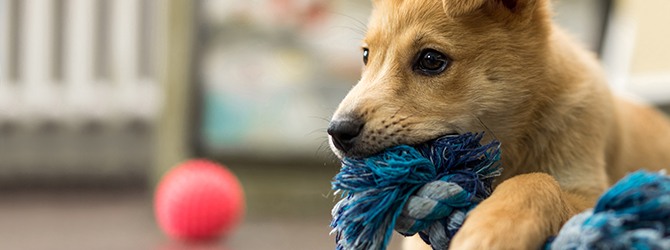Puppy vaccination schedule
Protecting your puppy against life-threatening diseases is one of the most important things you can do to keep them healthy. Vaccines protect your dog from serious and often life-threatening diseases like parvovirus, distemper, leptospirosis, and infectious canine hepatitis.
Puppy vaccinations are split into two categories, core and non-core. Core vaccinations are vaccines that are recommended for all dogs. Non-core vaccinations are additional vaccines that protect against certain diseases your dog may or may not be at risk of.
1. First vaccination: 6–10 weeks old
Your puppy's first set of vaccinations is usually given when they're between 6 and 10 weeks old. This protects them against:
- Parvovirus is a highly contagious virus causing severe vomiting, diarrhoea, and dehydration. It's particularly dangerous for young puppies.
- Distemper is a serious virus that can cause fever, breathing problems, and long-term neurological issues.
- Leptospirosis is a bacterial infection that can damage vital organs like the kidneys and liver. It can also spread to humans.
- Infectious canine hepatitis (ICH) affects the liver, kidneys, and eyes.
This first round of vaccines only involves one or two injections, as the vaccines can be combined.
Puppy vaccination schedule

Download your puppy vaccination schedule here
2. Second vaccination: 10–14 weeks old
The second vaccination is given 2 to 4 weeks after the first. This strengthens their protection against parvovirus, distemper, leptospirosis, and infectious hepatitis. These two injections are needed to build up full immunity.
3. Third vaccination (if needed): 14–18 weeks old
Some puppies may need a third injection, particularly those in higher-risk groups (such as black and tan breeds) or if they had their first vaccination at a young age for early protection. Your vet will let you know if your puppy needs this extra dose to give them the best protection.
4. First booster: 12 months old
Once your puppy is a year old, they'll need a booster to keep their immunity strong. This booster covers:
- Parvovirus
- Distemper
- Leptospirosis
- Infectious hepatitis
Keeping up with boosters helps maintain their protection throughout their life.
5. Annual boosters: every year for life
While some vaccines, like parvovirus, distemper, and hepatitis, only need boosting every three years, leptospirosis requires a yearly booster. Since leptospirosis can be caught from contaminated water or soil, it's important to keep up with these boosters each year.
Optional vaccines
In addition to the core vaccines, there are others you might want to consider depending on your puppy's lifestyle:
- Kennel cough (parainfluenza) vaccine is recommended if your dog spends time with other dogs in places like kennels, doggy day care, or at events. Many dog boarding kennels require the kennel cough vaccine to be given at least two weeks before your dog stays with them, so plan ahead.
- Rabies vaccine is required for dogs travelling outside the UK. If you're planning to take your dog abroad, make sure they're vaccinated for rabies.
Keeping your puppy safe before they're fully vaccinated
Until your puppy has had all their vaccinations, it's important to limit their exposure to places where they could pick up infections. Here are a few tips:
- Avoid public places like parks or pavements where other dogs might have been.
- Only let them socialise with dogs that are fully vaccinated.
- If you need to take them out, carry them rather than letting them walk in risky areas.
Need more info on your puppy's vaccinations?
For expert advice on puppy vaccinations, get in touch with your local vet.
Find your nearest vet using our find a vet page, or speak to a vet online using our video vets service.

